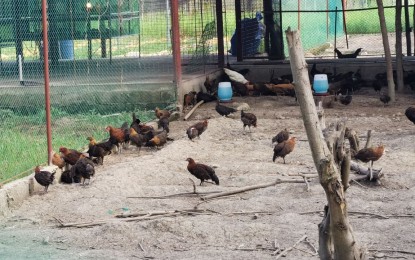
BACKYARD POULTRY. Native chickens are being raised in the backyard by a local supplier, in this undated photo. The provincial government of Negros Oriental's ban on live chickens and ducks from Luzon and Mindanao remains in effect. (PNA file photo by Mary Judaline Flores Partlow)
DUMAGUETE CITY – The Provincial Veterinary Office (PVO) in Negros Oriental said the ban on the entry of live chickens and other birds from Luzon and Mindanao remains in effect, an official said on Wednesday.
“Except for day-old chicks, the province will not accept live chickens and ducks from these areas as part of our monitoring and vigilance against Avian Influenza or bird flu,” Jaymar Vilos, designated PVO information officer, told the Philippine News Agency in an interview.
Vilos added that live chickens from the Visayas, however, can be brought into Negros Oriental provided that suppliers comply with the requirements.
This comes amidst an announcement from the Bureau of Animal Industry (BAI) of the Department of Agriculture that there is no outbreak of bird flu in Tarlac province in Luzon, contrary to what was previously reported.
The ban on the entry of live poultry in Negros Oriental was enforced last year during the administration of the late Governor Carlo Jorge Reyes following the detection of bird flu in some areas in Luzon and Mindanao, he said.
Negros Oriental remains free from Avian Influenza and in fact, some farms in the province accredited by the BAI are exporting poultry products to South Korea provided the country’s standards are met, Vilos said.
He, however, stressed that they are continuously monitoring the movement of ducks and migratory birds as these could be carrying the Avian Influenza virus. (PNA)
